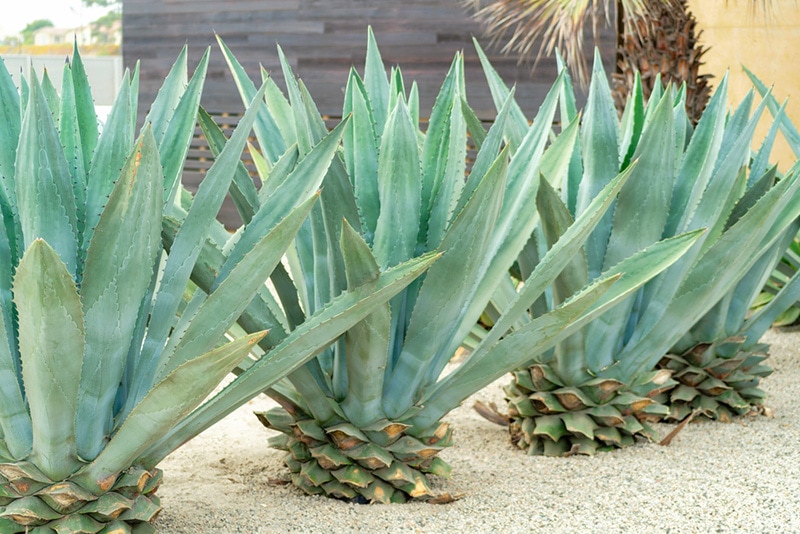Dog owners know that dogs do plenty of unusual things, but one of the oddest behaviors is when a dog barks at their food. This can be frustrating because the dog isn’t barking for their food, which would indicate that they want something. They are barking at their food, which doesn’t seem to make any sense at all.
In this article, we look at the reasons that your dog may be barking at their food and what you can do about it. This is a strange behavior, but once you find the cause of it, you can try to keep it from continuing.
Things to Consider
Before we get into the reasons that dogs bark at their food, there are a few things to consider in order to help you determine why your dog is behaving this way. Has your dog always done this, or is it new behavior? Are there any changes in your home or routine that you can identify as the cause of this?
Different dogs can bark at their food for different reasons, so it’s important to know what’s affecting your pup specifically. Keeping track of the details of the behavior will help you determine why it’s happening. They’re also good to know in case you must bring your dog to the vet.
 The 10 Reasons That Dogs Bark at Their Food
The 10 Reasons That Dogs Bark at Their Food
1. The Dog’s Food Was Changed
If you’ve recently changed your dog’s food, they may be barking at it just because it’s new. If they notice a new scent or flavor in their food, they may become confused and bark.
If your dog is picky, they may want to eat the food but not like the new ingredients in it. You can try to read your dog’s body language and see if they are unhappy while they’re barking. A wagging tail and barking between mouthfuls indicate a happy dog. A tucked tail and flattened ears or trying to flip the bowl mean that your dog is not a fan of the new diet change.
What to Do
Gradually mix your dog’s old food with their new one, starting with a mix of 75% old and 25% new. Increase the amount of new food each day and decrease the old until you are feeding them only the new food. Your dog may just need more time to get used to the new flavors. A gradual feeding change is also recommended to avoid gastrointestinal upset.
2. The Dog Feels Threatened
A dog that feels threatened may resort to resource guarding. This aggressive possession is natural in wild dogs, but it doesn’t work well for domestic dogs in households. The behavior includes growling, barking, lunging, and biting people and other animals over their possessions, including food. The dog’s body will usually be stiff, with its head down while they are barking and growling as others approach them. In this case, the dog isn’t barking at their food but because they feel that their food is going to be taken away.
What to Do
First, don’t punish your dog. Understand that this is happening because the dog is feeling threatened in some way. Punishing or scolding them will make that feeling more intense. Working with a professional trainer can help your dog feel more secure about their food and other possessions.
If the resource guarding is mild, try showing your dog that you are not a threat to their food. When you walk by, toss a piece of something delicious, like chicken or steak, into their bowl so they associate your presence near them with positive feelings.
You can also try feeding your dog dry kibble one handful at a time. Fill a bowl with their food and stand next to the dish, dropping a few pieces in. After the dog finishes the food, they will likely look at you and expect you to give them more. This will show them that you are not a threat to them, but their provider whom they can trust.
Please make sure you are feeding your dog enough food so that the dog is not resource-guarding because it is feeling hungry. Dog calorie calculators are very helpful if you’re not sure how much your dog needs to eat. You may also want to ask your veterinarian about the right amount of food to maintain a healthy weight.
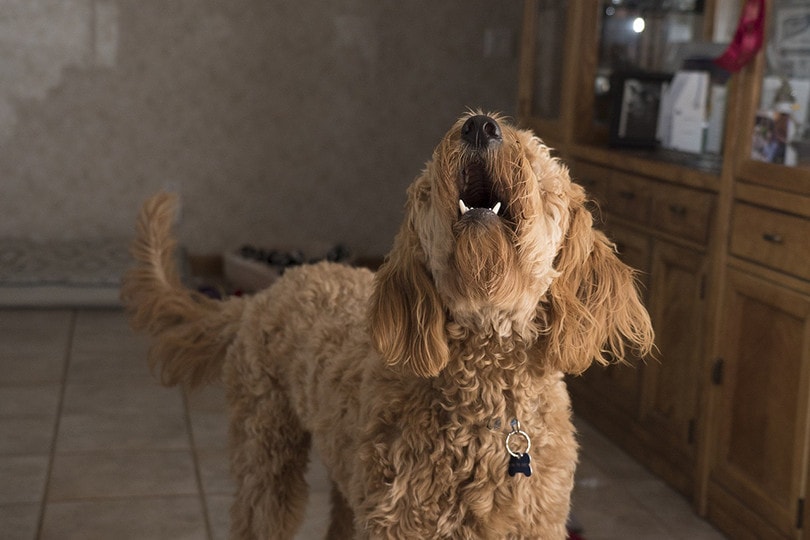
3. The Dog Is Excited to Eat
If you have a rambunctious pup, they may be excited about many things, and one of those things is eating! Barking or howling as you’re giving them their bowl may just be their way of expressing how happy they are to have their food. This behavior may be accompanied by jumping, tail wagging, and pawing at their dish. If your dog is feeling especially hungry, they will be even more excited to eat.
What to Do
If your pup is just excited and you don’t mind the vocalness, there is nothing that needs to be done. Some dog owners find it endearing that their dog is so happy to eat their food. If you’d prefer this behavior to stop, though, you can train your dog to be calm at mealtimes. Wait for them to calm down before you give them their bowl. They will soon learn that subdued behavior is a quick way to get what they want.
4. The Dog Is Scared
One reason a dog may bark at their food is that something about it is scaring them. In many cases, it’s the bowl. If you’ve recently changed your dog’s food bowl or dish, they may not want to go near it. If the dog is barking and backing up, the bowl could be the reason.
If the bowl is shiny, they may not like the movement of their reflection in it. Maybe the tags on their collar clink against the bowl, making a sound that they don’t like. If the bowl is too small for your dog, it might be uncomfortable for them to eat out of it. For whatever reason, your dog has decided that their food bowl is the enemy and they are scared of it.
What to Do
It’s common for puppies to bark at food bowls when they’re weaning because they’ve never seen one before and don’t know how to use it. They need time to figure it out.
If your adult dog is barking at their food bowl and it’s not new, consider changing it. Try a plastic or ceramic bowl if they are barking at a stainless-steel bowl. Consider switching to a larger bowl if your dog has trouble eating all their food comfortably. The bowl should not restrict the dog’s mouth movements or scrape against the sides of their face as they eat. They should be able to reach the bottom of the bowl.
If that doesn’t work, consider using a plate instead.
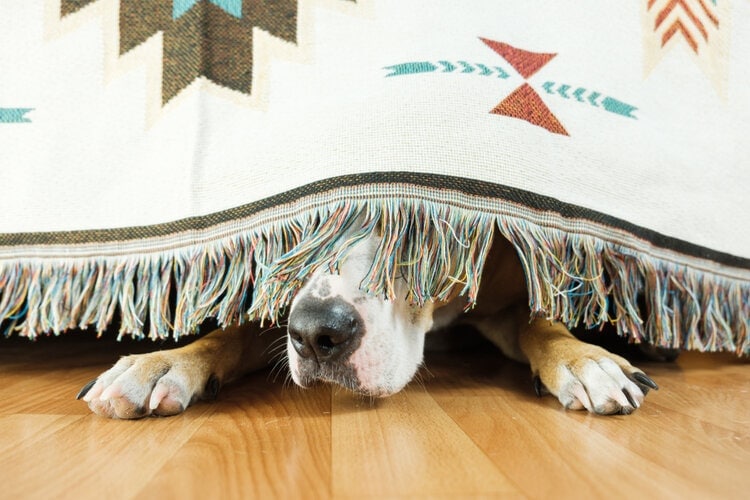
5. The Dog Is in Pain
Sometimes dogs will bark at their food if they want to eat it but know that it’ll cause them pain if they do. The most likely reasons for this are mouth and dental pain. Gum disease, gingivitis, periodontitis, and cracked or decaying teeth can all cause excessive pain for your dog when they chew. If you notice that your dog is chewing on one side of their mouth, hesitant to eat, or having food fall out of their mouth while they’re eating, they could be experiencing a dental issue.
What to Do
Take your dog to the vet for an exam. Your vet can determine if any teeth are broken, cracked, or rotting. They will also look for swollen and bleeding gums. If your dog needs a dental cleaning, one can be scheduled. During this procedure, any rotten or broken teeth can be removed.
6. Your Dog Has Separation Anxiety
If the last step in the morning before you leave the house is feeding your dog, your dog will start to associate their food with you leaving. For dogs with separation anxiety, this can lead to them barking at their food. You’ll notice this that is likely the case if your dog refuses to eat until you return home.
What to Do
Try changing your dog’s mealtime to when you wake up or at least an hour before you leave the house. You can also try feeding them in a different part of the house where they feel safer, like a crate or a gated area.
Give them things to keep them occupied while you’re gone, like a puzzle toy or Kong filled with treats. Make the routine before you leave for the day something that they look forward to rather than dread.
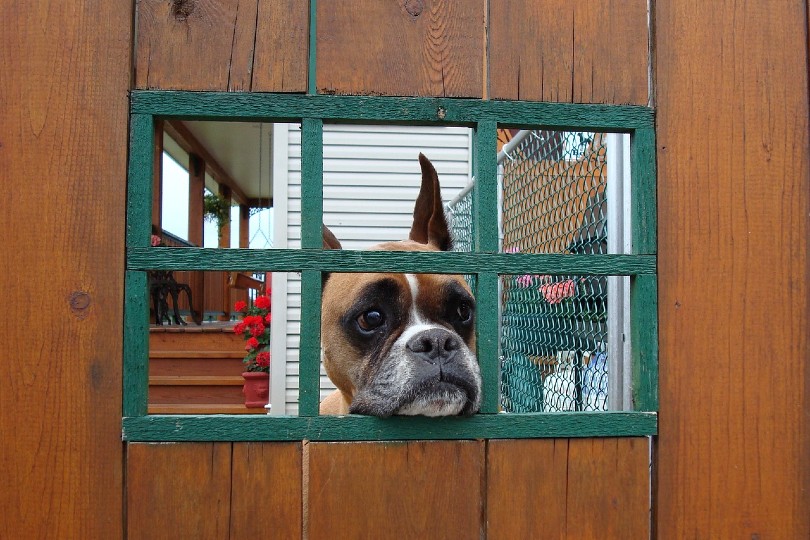
7. The Dog’s Schedule Is Off
If the timing is off for your dog’s meals, they may not be hungry when you feed them. If your dog is full and doesn’t feel like eating, they may bark to voice their displeasure.
What to Do
Consider if the timing has changed recently for your dog’s meals. If you’ve had to change your schedule or feed them much earlier or later than usual, they may just be off their routine. You can wait until your dog gets hungry again and feels like eating.
You can also make slower changes. If you suddenly tried to feed your dog at 5 p.m. when they are used to eating at 8 p.m., they may bark because it’s too early. Instead, try feeding your dog at 7 p.m. for a few days. Then switch to 6 p.m. After a few days of that, feed your dog at 5 p.m. Allow them to gradually get used to the time change of their meals.
8. The Dog Is Bored
If your dog is filled with stored energy that hasn’t been burned off properly, they may bark at their food because it’s an outlet for this. Relaxed, happy dogs are eager to eat. When a dog is bored, they aren’t getting enough mental or physical stimulation during the day.
What to Do
Make sure your dog is getting the proper amount of exercise that they need each day for their breed, age, and activity level. Try feeding your dog after a long walk or play session. You can also feed them in a treat ball instead of a bowl to force them to do an activity while they eat. It will keep them mentally engaged while they continually work to get their reward.
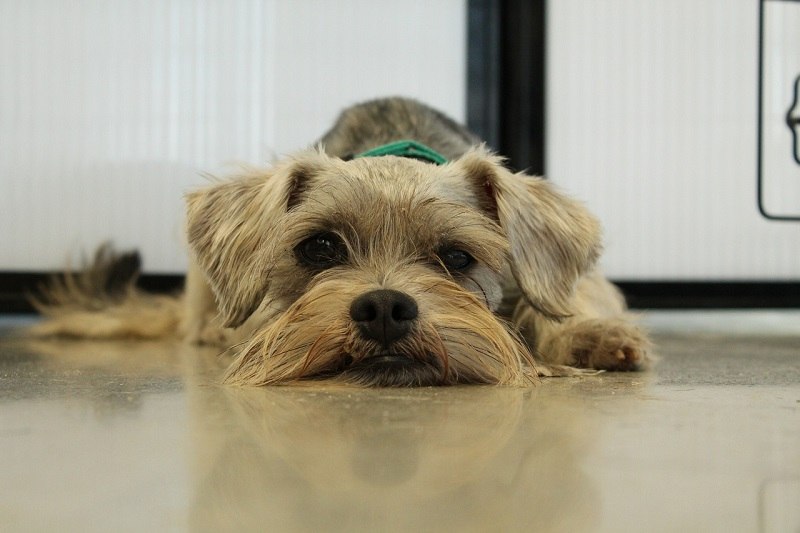
9. The Dog Has a Health Issue
Your dog could be barking at their food because something in their body is causing them pain. If they are experiencing a health issue, eating food might make the symptoms worse for them. Anything from an upset stomach, to kidney disease, can make dogs not want to eat and be upset about it. If barking at their food is a new, sudden behavior, a health issue should always be ruled out before you try other methods to get this to stop.
What to Do
Visit your vet so your dog can get checked out. If your dog goes longer than 72 hours without eating, this could be an emergency. After 48 hours without food, you should call the vet.
Your vet may recommend medications or appetite stimulants. The treatment will depend on what’s making the dog refuse food and instead bark at it. With the right treatment, your dog can start to feel better, and their appetite will return.
10. The Dog Has a Behavioral Issue
Some dogs are prone to neurotic tendencies or have canine compulsive disorder. While this is rare, these conditions can cause dogs to bark at their food. You’ll likely notice other behaviors too, such as tail chasing, fly biting, barking at shadows or ceiling fans, spinning, pacing, and obsessive licking.
What to Do
Canine compulsive disorder can be difficult to diagnose in dogs because they can’t tell us why they are obsessing over something. Start keeping track of your dog’s behaviors and documenting what they do and when they do it. These notes can help a vet or animal behaviorist determine what’s happening more clearly.
Training and behavior modification can help treat this condition. In extreme cases, your vet may recommend medication to be used in conjunction with training.
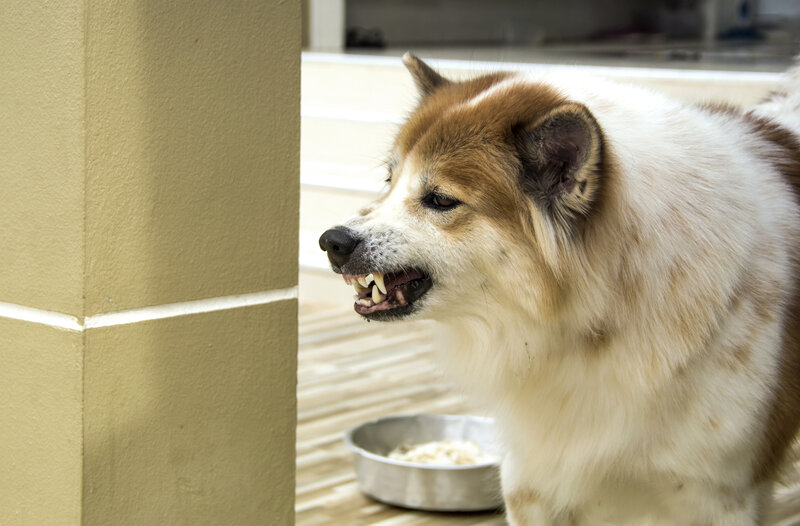
Conclusion
It can be confusing when your dog barks at their food. If this is new behavior, you will want to try to find out why this is happening and what you can do about it. Thankfully, some of the reasons that dogs do this are not serious. Others require a visit with a vet or animal behaviorist.
We hope that you were able to find out why your dog is barking at their food and what you can do to help them stop this and enjoy their mealtimes again.
- See also: Dog Anxiety Awareness Week
Featured Image Credit: Lipa23, Shutterstock
Contents
- Things to Consider
- The 10 Reasons That Dogs Bark at Their Food
- 1. The Dog’s Food Was Changed
- 2. The Dog Feels Threatened
- 3. The Dog Is Excited to Eat
- 4. The Dog Is Scared
- 5. The Dog Is in Pain
- 6. Your Dog Has Separation Anxiety
- 7. The Dog’s Schedule Is Off
- 8. The Dog Is Bored
- 9. The Dog Has a Health Issue
- 10. The Dog Has a Behavioral Issue
- Conclusion

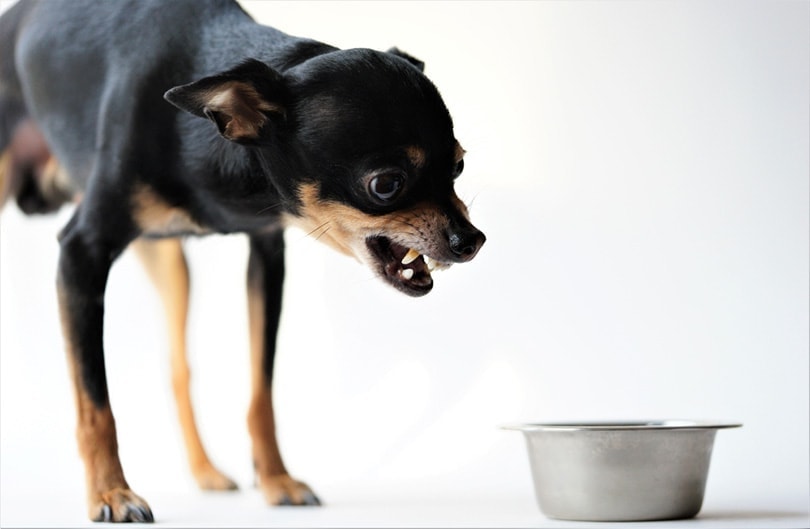
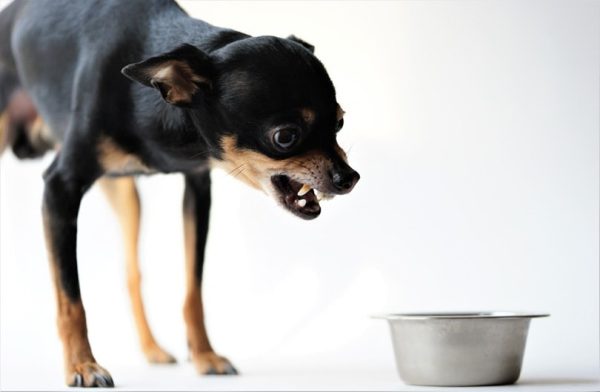


 The 10 Reasons That Dogs Bark at Their Food
The 10 Reasons That Dogs Bark at Their Food


